Ghana is preparing for its twin-elections of Presidential and Parliamentary tomorrow, 7th December 2020. These twin-elections constitute an important step in the development of the country. To this end, everything must be done to ensure that the outcome is one that is procured from a free and fair system.
Thus far, the umpire (Electoral Commission) has demonstrated a great sense of impartiality and has been transparent throughout the process, however, tomorrow's event which is also the climax of the entire process will have to be overwhelmingly transparent with all actors playing according to the rules of the game.
For the electorates beyond desiring a free and fair, is that the entire process must remain peaceful. Peace is not just a prerequisite, but also is the Sino quanon for the development of any people and cannot be altered on the whims and caprices of any self-centred individual or politician.
That is possible, but not a given. Even though Ghana 2020 is not the same as Ghana in the revolutionary days, the risk of renewed confrontation in the country is real. Now is the time for preventive action.
An election is an important mechanism in the democratic processes. The purpose of election is to provide citizens with the opportunity to choose freely who they desire to lead them and allocate power to them.
However, the stakes are often very high in this process and this coupled with the underlying tensions in society requires that the processes are managed with tact and sincerity lest it results in violent outcomes.
In line with this, all political parties, especially, the two leading political parties; the National Democratic Congress (NDC) and the New Patriotic Party (NPP) must prevent any form of degeneration by negotiating a code of conduct which will guard against fraud and violence at elections, on December 7 polls.
A challenge for Human Security
Less visible and more complex than armed conflicts, political and electoral violence remain an important threat to human security and regional stability. In Africa and Asia, numerous examples from many years reflect the frequency of political and electoral violence. In Africa alone, it is estimated that nearly 20 percent of elections over the last two decades have been marred by violence. Such occurrences of violence do not result directly from elections but reflect instead the breakdown of political processes. If they are legitimate and inclusive, elections can pave the way for freedom of expression and promote peaceful transitions.
The 2010-2011 post-electoral conflict in Côte d’ Ivoire claimed more than 3,000 lives and caused significant economic damage. The courage and determination of Ivoirians have allowed the country to stage a remarkable recovery and make real strides in economic and social development.
Interestingly, Côte d’Ivoire’s wounds cannot be healed with economic growth alone. As the pandemic cripples the economy, they are returning to the fore. In the absence of justice for past atrocities and effective national reconciliation, the political atmosphere remains tense.
The warning signs are clear. Against a background of distrust and controversy over the legitimacy of the electoral roll, the independence of the electoral commission, and the exclusion of some political leaders from the race, there has been a rise in hate speech and clashes along ethnic and religious fault lines. Conflict is not inevitable, but critical confidence-building measures are indispensable and urgent.
Thus, relying on the mandate of peace promotion, I call on the people of Ghana to ignore the siren calls of those who would try to manipulate them with appeals to divisive identity politics and promote peace and democracy in this context of elections.
Elections are important pillars of a wider agenda supporting democratic processes. It is a moment when citizens can hold their political representatives accountable and when power can be redistributed. Inclusive, transparent elections, free from violence, and fear are important conditions to meet these expectations.
Support for civil society and media are also supporting strategies; I appeal to all journalists to provide fact-based information. It promotes a conflict-sensitive approach in the media, for example in Mali, which should avoid inflaming already tense situations. It supports civil society organizations, for example during the 2015 elections in Myanmar, in informing citizens about the election process and the significance of broad and peaceful participation. It further supports civil society platforms conducting domestic election observation. This is important to enhance the legitimacy of the election process.
A recommended good practice is, instead of ad hoc contributions, to rather engage on the long term, ideally during the entire election cycle as part of a larger governance/democracy promotion portfolio; it is particularly important to build trust and legitimacy in fragile contexts.
Opinions of Sunday, 6 December 2020
Columnist: Chineseman, Osei and GuyGee (COG)



















